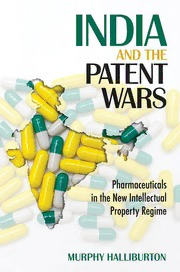
India and the Patent Wars PDF
Preview India and the Patent Wars
India and the Patent Wars A volume in the series The Culture and Politics of Health Care Work edited by Suzanne Gordon and Sioban Nelson A list of titles in this series is available at cornellpress.cornell.edu. India and the Patent Wars Pharmaceuticals in the New Intellectual Property Regime Murphy Halliburton ILR Press an imprint of Cornell University Press Ithaca and London Copyright © 2017 by Cornell University All rights reserved. Except for brief quotations in a review, this book, or parts thereof, must not be reproduced in any form without permission in writing from the publisher. For information, address Cornell University Press, Sage House, 512 East State Street, Ithaca, New York 14850. First published 2017 by Cornell University Press First printed in paperback, 2017 Printed in the United States of America Library of Congress Cataloging-in-Publication Data Names: Halliburton, Murphy, 1964– author. Title: India and the patent wars : pharmaceuticals in the new intellectual property regime / Murphy Halliburton. Description: Ithaca : ILR Press, an imprint of Cornell University Press, 2017. | Includes bibliographical references and index. Identifi ers: LCCN 2017016268 (print) | LCCN 2017022708 (ebook) | ISBN 9781501713972 (pdf) | ISBN 9781501713989 (ret) | ISBN 9781501713460 (cloth : alk. paper) | ISBN 9781501713477 (pbk. : alk. paper) Subjects: LCSH: Drugs—India—Patents. | Patent laws and legislation— India. | Pharmaceutical industry—India. | Medicine, Ayurvedic— Economic aspects—India. | Intellectual property—India. | Patents (International law) Classifi cation: LCC KNS1150.M44 (ebook) | LCC KNS1150.M44 H35 2017 (print) | DDC 346.5404/86—dc23 LC record available at https://lccn.loc.gov/2017016268 Cornell University Press strives to use environmentally responsible suppliers and materials to the fullest extent possible in the publishing of its books. Such materials include vegetable-based, low-VOC inks and acid-free papers that are recycled, totally chlorine-free, or partly composed of nonwood fi bers. For further information, visit our website at cornellpress.cornell.edu. This book is dedicated to Amy, Luca, and Sophie. Contents Acknowledgments ix Note on Names of Medications xi Introduction 1 1. The Invention and Expansion of Intellectual Property 21 2. The New Patent Regime: The Activists and Their Allies 36 3. Ayurvedic Dilemmas: Innovation, Ownership, and Resistance 55 4. The Gilead Model and the Perspective of Big Pharma 91 5. The View from Hyderabad: The “Indian” Pharmaceutical Industry and the New Patent Regime 116 Conclusion 140 Notes 151 References 163 Index 179 Acknowledgments I would like to thank the many individuals and organizations whose assistance enabled this long-term research project to become a book. This work is the product of bits and pieces of investigation and writing that started around 2003 and continued through 2015. I am especially grateful to representatives from India- and United States–based biomedical phar- maceutical companies who took the time to meet with me and discuss their perspectives on patent controversies and drug access issues and to the practitioners of ayurvedic medicine and representatives of ayurvedic pharmaceutical companies who offered their views on the same topics and shared their concerns about biopiracy. The many conversations I have had with Krishna Ravi Srinivas and my meeting with his colleague T. C. James, both of Research and Information System for Developing Coun- tries, New Delhi, were important to shaping my ideas, and I am grateful to my long-term friend and colleague Dr. K. Gireesh for introducing me to informants in Kerala and for his insight and camaraderie during my stays in Thiruvananthapuram.
